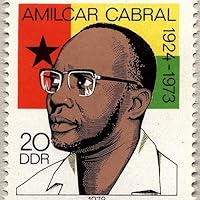Decolonization Quotes
Quotes tagged as "decolonization"
Showing 1-30 of 109

“At this juncture, the 'world' is no longer confined to just one or two places; it has spread worldwide.”
―
―

“Do you know why people like me are shy about being capitalists? Well, its because we, for as long as we have known you, were capital, like bales of cotton and sacks of sugar, and you were commanding, cruel capitalists, and the memory of this so strong, the experience so recent, that we can't quite bring ourselves to embrace this idea that you think so much of. As for hat we were like before we met you, I no longer care. No periods of time over which my ancestors held sway, no documentation of complex civilisations, is any comfort to me. Even if I really came from people who were living like monkeys in trees, it was better to be that than what happened to me, what I became after I met you.”
― A Small Place
― A Small Place

“Always remember that the people are not fighting for ideas, nor for what is in men’s minds. The people fight and accept the sacrifices demanded by the struggle in order to gain material advantages, to live better and in peace, to benefit from progress, and for the better future of their children. National liberation, the struggle against colonialism, the construction of peace, progress and independence are hollow words devoid of any significance unless they can be translated into a real improvement of living conditions.”
― Return to the Source: Selected Speeches of Amílcar Cabral
― Return to the Source: Selected Speeches of Amílcar Cabral

“A trip to a Central American jungle to watch how Indians behave near a bridge won't make you see either the jungle or the bridge or the Indians if you believe that the civilization you were born into is the only one that counts. Go and look around with the idea that everything you learned in school and college is wrong.”
― The Bridge in the Jungle
― The Bridge in the Jungle

“The act of writing, it seems to me, makes up a shelter, allows space to what would otherwise be hidden, crossed out, mutilated. Sometimes writing can work toward a reparation, making a sheltering space for the mind. Yet it feeds off ruptures, tears in what might otherwise seem a seamless, oppressive fabric.”
― The Shock of Arrival: Reflections on Postcolonial Experience
― The Shock of Arrival: Reflections on Postcolonial Experience

“Our minds must be as ready to move as capital is, to trace its paths and to imagine alternative destinations.”
― Feminism without Borders: Decolonizing Theory, Practicing Solidarity
― Feminism without Borders: Decolonizing Theory, Practicing Solidarity

“National liberation, national reawakening, restoration of the nation to the people or Commonwealth, whatever the name used, whatever the latest expression, decolonization is always a violent event.”
― The Wretched of the Earth
― The Wretched of the Earth

“Ultimately, body liberation is about freeing yourself from the commodification of your body, rejecting the use of your body as a tool of capitalism, and claiming your freedom.
It’s about abandoning colonized ideas of acceptability and reclaiming the freedom to live your life on your terms and use your body as a vehicle for your pleasure and exploration of the world.”
― Decolonizing Wellness
It’s about abandoning colonized ideas of acceptability and reclaiming the freedom to live your life on your terms and use your body as a vehicle for your pleasure and exploration of the world.”
― Decolonizing Wellness

“Today's world, whether we like it or not is the work of Hitler, without Hitler, there would have been no partition of Germany and Europe, without Hitler there would have been no Russians and Americans in Berlin, without Hitler there would have been no Israel, without Hitler there would have been no decolonization, at least not such a rapid one, there would be no Asia, Arab or black African emancipation, and no diminution of European preeminence, or more accurately, there would be non of all this without Hitler's mistakes, he certainly did not want any of it.”
― The Hitler of History
― The Hitler of History

“Remember, and feel free to remind white allies, that you don’t need permission from anyone to pursue self-care.
Invite them to spend less time policing POC behavior and more time investigating long-standing systems of oppression and their impact.”
― Decolonizing Wellness
Invite them to spend less time policing POC behavior and more time investigating long-standing systems of oppression and their impact.”
― Decolonizing Wellness

“Asking the survivors of abuse to captain personal improvement projects for members of the dominant culture adds to the chronic stress that already compromises our well-being.
Chronically expecting free labor, emotional or otherwise, is colonizer trash if I’ve ever seen it.”
― Decolonizing Wellness
Chronically expecting free labor, emotional or otherwise, is colonizer trash if I’ve ever seen it.”
― Decolonizing Wellness

“El blanco habló de otro país más allá del mar donde una mujer poderosa se sentaba en el trono, mientras los hombres y las mujeres bailaban a la sombra de su autoridad y benevolencia. Ella estaba dispuesta a extender su sombra para cubrir a los agikuyu. Se rieron de este hombre excéntrico, cuya piel estaba tan escaldada que el negro de fuera se había pelado. El agua caliente le debía de haber afectado a la cabeza [...] Más tarde, o eso decían, Waiyaki había sido enterrado vivo en Kibwezi con la cabeza apuntando al centro de la tierra, un aviso viviente para quienes, en años venideros, osaran desafiar la autoridad de la mujer cristiana cuya sombra protectora dominaba ahora tierra y mar.
Entonces nadie se dio cuenta: pero mirando hacia atrás pudimos ver que la sangre de Waiyaki contenía una semilla, un grano, que dio origen a un movimiento cuya mayor fortaleza, desde ese día, nacía del vínculo con la tierra.”
― A Grain of Wheat
Entonces nadie se dio cuenta: pero mirando hacia atrás pudimos ver que la sangre de Waiyaki contenía una semilla, un grano, que dio origen a un movimiento cuya mayor fortaleza, desde ese día, nacía del vínculo con la tierra.”
― A Grain of Wheat

“[Donor Countries]
When are we going to understand
That donor countries never donate anything for free.
When are we going to understand
That the only countries that donate
Are those with the biggest role in destruction and ravage?
That such countries only donate
To shape societies and destroyed countries
According to their whims and their desires…
That their only aim is
To keep the defeated
the marginalized
the disempowered
and the impoverished
In that state for as long as they can…
When are we going to understand
That the easiest way to identify and name the big criminals,
Is to take a quick look at the list of donor countries?
[Original poem published in Arabic on November 12, 2022 at ahewar.org]”
―
When are we going to understand
That donor countries never donate anything for free.
When are we going to understand
That the only countries that donate
Are those with the biggest role in destruction and ravage?
That such countries only donate
To shape societies and destroyed countries
According to their whims and their desires…
That their only aim is
To keep the defeated
the marginalized
the disempowered
and the impoverished
In that state for as long as they can…
When are we going to understand
That the easiest way to identify and name the big criminals,
Is to take a quick look at the list of donor countries?
[Original poem published in Arabic on November 12, 2022 at ahewar.org]”
―

“Rebuilding an inequitable and harmful relationship is not easy. But for the good of all our children – Indigenous and not – the hard work must begin.”
― Seven Fallen Feathers: Racism, Death, and Hard Truths in a Northern City
― Seven Fallen Feathers: Racism, Death, and Hard Truths in a Northern City
“If intergenerational trauma can alter DNA, why can’t intergenerational love?”
― A Mind Spread Out on the Ground
― A Mind Spread Out on the Ground

“Storm's coming! Huts and homes of the humble will thrive, while castles and palaces of thieves will crumble. Either we are explorers of equality and dignity, or we are crown worshipping animal.”
― Visvavictor: Kanima Akiyor Kainat
― Visvavictor: Kanima Akiyor Kainat

“You don’t have to dedicate your precious time to attempting to get faux allies to understand that while they are clearly the center of their universe, they are not the center of yours.”
― Decolonizing Wellness
― Decolonizing Wellness

“When are we going to understand
That donor countries never donate anything for free.
...
When are we going to understand
That the easiest way to identify and name the big criminals,
Is to take a quick look at the list of donor countries?”
―
That donor countries never donate anything for free.
...
When are we going to understand
That the easiest way to identify and name the big criminals,
Is to take a quick look at the list of donor countries?”
―
“When writing on the subject of civilization, one must understand that the ability to read or write a European language does not create a superior civilization. Nor does the ability to point exploding sticks that cause instantaneous death or injury, or to launch missiles that could blow the world apart, provide a moral basis to declare one’s culture more civilized than another. The question to ask when judging the values and merits of a civilization must always be: “How does the civilization respond to the human needs of its population?” By this standard, because they created social and political systems that ensured personal liberty, justice and social responsibility, most Amerindian civilizations must be given very high marks.
When making an unbiased assessment, and comparing the values of early American civilizations with those of European civilizations, one cannot but find that the suppression and wanton destruction of American civilizations by European civilizations was in many ways a case of inferior civilizations overcoming superior ones. This is especially true in the area of respect for human rights. Although they were not as technologically advanced as the Europeans were by 1492, many Amerindian Nations possessed democratic political practices that were light years ahead.”
― We Were Not the Savages: First Nations History ? Collision Between European and Native American Civilizations
When making an unbiased assessment, and comparing the values of early American civilizations with those of European civilizations, one cannot but find that the suppression and wanton destruction of American civilizations by European civilizations was in many ways a case of inferior civilizations overcoming superior ones. This is especially true in the area of respect for human rights. Although they were not as technologically advanced as the Europeans were by 1492, many Amerindian Nations possessed democratic political practices that were light years ahead.”
― We Were Not the Savages: First Nations History ? Collision Between European and Native American Civilizations
“What if we created a system where funds spent on imperialism in the form of defense and bank bailouts were redirected to heal the Earth by decolonizing the atmosphere and building a dignified future for our relatives in the Global South? This is not simply a question to ponder. It is a life-or-death program we must take seriously.”
―
―

“Our respective racial containment isolates us from each other, enforcing our thoughts that our struggles are too specialized, unrelatable to anyone else except others in our group, which is why making myself, and by proxy other Asian Americans, more human is not enough for me. I want to destroy the universal. I want to rip it down. It is not whiteness, but our contained condition that is universal, because we are the global majority, by we, I mean nonwhites, the formally colonized. Survivors such as Native Americans, whose ancestors have already lived through endgames. Migrants and refugees living through endtimes currently, fleeing the floods and droughts and gang violence, reaped by climate changed that's been brought on by western empire. In Hollywood, whites have churned out dystopian fantasies by imagining themselves as slaves and refugees in the future.”
― Minor Feelings: An Asian American Reckoning
― Minor Feelings: An Asian American Reckoning
“When we talk about any particular park, or city parks in general, what we are really talking about is how urban space could and should be allocated and used. Entwined within those conversations are presumptions about how human relationships with the other-than-human world can and should be mediated and controlled. The notion that parks are “good for people,” whether they are immense national parks far from cities or small urban parks set amidst dense residential, commercial and industrial activity, rests on highly questionable ideologies that tend to obscure far more than they illuminate. Claims to “diversity” habitually feign a commitment to commonality. When we talk about any particular park, or city parks in general, what we are really talking about is how urban space could and should be allocated and used. Entwined within those conversations are presumptions about how human relationships with the other-than-human world can and should be mediated and controlled. The notion that parks are “good for people,” whether they are immense national parks far from cities or small urban parks set amidst dense residential, commercial and industrial activity, rests on highly questionable ideologies that tend to obscure far more than they illuminate. Claims to “diversity” habitually feign a commitment to commonality without asking after the rationalities that structure the subjects of those commons: who is allowed in and under what conditions? without asking after the rationalities that structure the subjects of those commons: who is allowed in and under what conditions?”
― On This Patch of Grass: City Parks on Occupied Land
― On This Patch of Grass: City Parks on Occupied Land
“A role could call for an indigenous Aeta woman and they would hire a half white, half Filipina woman and paint her skin Black just so she could play a maid.”
― You're That Bitch: And Other Lessons About Being Unapologetically Yourself
― You're That Bitch: And Other Lessons About Being Unapologetically Yourself

“The partition of India was not simply the result of an internal feud between Muslims and Hindus. Nor was it an isolated event. Indonesia's numerous secessionists movements, the bloody border disputes between Morocco and Algeria, the fifty-year civil war in Sudan between Arab northerners and Black African southerners, the partitioning of Palestine and the resulting cycle of violence, the warring ethnic factions in Iraq, and the genocide of nearly a million Tutsis at the hands of the Hutus in Rwanda, to name but a handful of cases, have all been in considerable measure a result of the decolonization process.”
― No God but God: The Origins, Evolution and Future of Islam
― No God but God: The Origins, Evolution and Future of Islam

“Arabs & Garbage"
Strange is the Arab story with garbage!
Who told them
who taught them
to toss garbage randomly
wherever and however they please?
When will the Arabs understand
that placing garbage in its right place
will solve half of their environmental and societal problems?
And the other half of their problems
will be solved, too, as soon as they stop
tossing out their human gems
forcing out their most talented and qualified human capital
to serve foreigners in foreign lands?
When will the Arabs stop getting rid of their best minds,
replacing them with foreign garbage they glorify
simply because the foreign individuals have white skin and blue eyes
and claim to possess skills and expertise
the Arabs can’t survive without…
When will the Arabs understand
that placing garbage in its right place
-be it the garbage that govern their countries
or the foreign garbage they import –
will solve all their problems?
[Original poem published in Arabic on February 20, 2024 at ahewar.org]”
―
Strange is the Arab story with garbage!
Who told them
who taught them
to toss garbage randomly
wherever and however they please?
When will the Arabs understand
that placing garbage in its right place
will solve half of their environmental and societal problems?
And the other half of their problems
will be solved, too, as soon as they stop
tossing out their human gems
forcing out their most talented and qualified human capital
to serve foreigners in foreign lands?
When will the Arabs stop getting rid of their best minds,
replacing them with foreign garbage they glorify
simply because the foreign individuals have white skin and blue eyes
and claim to possess skills and expertise
the Arabs can’t survive without…
When will the Arabs understand
that placing garbage in its right place
-be it the garbage that govern their countries
or the foreign garbage they import –
will solve all their problems?
[Original poem published in Arabic on February 20, 2024 at ahewar.org]”
―

“Happiness is not lame sex with diseased dickheads from the internet with no social or sexual charisma, whose entire personality is PureGym, and then finding yourself constantly dashing off to 56 Dean Street to make sure you haven't contracted chlamydia or worse. Happiness is not the School of Oriental and African Studies, or the Royal African Society, or any Africanists and Orientalists who schlep to cities like Kolkata and Kampala, and find endlessly inventive ways to weaponise their whiteness by explaining decolonisation to folks their own ancestors are still fucking over from beyond the grave.”
―
―
“Duran argues for the need for healing institutions to retain culturally competent staff and that the adherence to strictly Western models of treatment maintains the colonization process. Hodge, Limb, and Cross claim that the Western therapeutic project is inconsistent with many Indigenous cultures and often serves as a form of Western colonization.”
― Decolonizing Trauma Work: Indigenous Stories and Strategies
― Decolonizing Trauma Work: Indigenous Stories and Strategies
“It is widely recognized that Indigenous peoples are often not well served by Western treatment styles and those seeking help are often confronted with more alienation and traumatization.
Sones et al. point out that data regarding the mental health and wellness of Indigenous peoples is lacking "partly because of the challenges in the identification of indigenous clients, mistrust of mainstream health, frequent absence of culturally competent care, and lack of access to indigenous healing options and care.
Furthermore, culturally influenced Indigenous behaviour is often misinterpreted by Western-oriented clinicians as evidence of psychopathy.”
― Decolonizing Trauma Work: Indigenous Stories and Strategies
Sones et al. point out that data regarding the mental health and wellness of Indigenous peoples is lacking "partly because of the challenges in the identification of indigenous clients, mistrust of mainstream health, frequent absence of culturally competent care, and lack of access to indigenous healing options and care.
Furthermore, culturally influenced Indigenous behaviour is often misinterpreted by Western-oriented clinicians as evidence of psychopathy.”
― Decolonizing Trauma Work: Indigenous Stories and Strategies

“The further north the bus moved, the more drab became the buildings, the streets and the people. Cheap stores selling clothes, furniture, kitchen utensils: “Easy terms, ten months to pay!” Cafés became dimmer, the streets narrower and noisier, more and more children filled the sidewalks. Men out of work, with nothing to do and no place to go, stood in sullen, futile groups on street corners. Arab music blared from the dark cafés or from the open windows of bleak hotels. Then suddenly, police were everywhere, stalking the streets, eyes moving insolently from face to face, submachine guns strung from their shoulders. It was like Harlem, Simeon thought, except that there were fewer cops in Harlem.”
― The Stone Face
― The Stone Face
All Quotes
|
My Quotes
|
Add A Quote
Browse By Tag
- Love Quotes 97k
- Life Quotes 75.5k
- Inspirational Quotes 72.5k
- Humor Quotes 43.5k
- Philosophy Quotes 29.5k
- Inspirational Quotes Quotes 27k
- God Quotes 26k
- Truth Quotes 23.5k
- Wisdom Quotes 23.5k
- Romance Quotes 23k
- Poetry Quotes 22k
- Death Quotes 20k
- Happiness Quotes 18.5k
- Life Lessons Quotes 18.5k
- Hope Quotes 18k
- Faith Quotes 18k
- Quotes Quotes 16.5k
- Inspiration Quotes 16.5k
- Spirituality Quotes 15k
- Religion Quotes 15k
- Motivational Quotes 15k
- Writing Quotes 14.5k
- Relationships Quotes 14.5k
- Life Quotes Quotes 14k
- Love Quotes Quotes 13.5k
- Success Quotes 13.5k
- Time Quotes 12.5k
- Motivation Quotes 12k
- Science Quotes 11.5k
- Knowledge Quotes 11k


